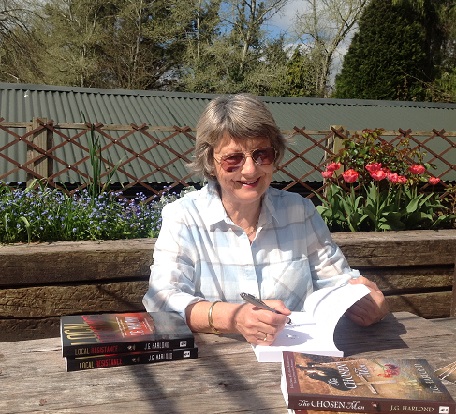 I’m delighted to welcome J G (Jane) Harlond to the blog to talk about being in ‘Exile’. Jane writes award-winning, page-turning novels set in the mid-17th and mid-20th centuries. Each story weaves fictional characters into real events. She describes her WWII Bob Robbins Home Front Mysteries as ‘cosy crime with a sinister twist’. Prior to becoming a full-time author, Jane taught English and World Literature in international colleges. She also wrote school text books for many years using her married name.
I’m delighted to welcome J G (Jane) Harlond to the blog to talk about being in ‘Exile’. Jane writes award-winning, page-turning novels set in the mid-17th and mid-20th centuries. Each story weaves fictional characters into real events. She describes her WWII Bob Robbins Home Front Mysteries as ‘cosy crime with a sinister twist’. Prior to becoming a full-time author, Jane taught English and World Literature in international colleges. She also wrote school text books for many years using her married name.
Jane is married to a retired Spanish naval officer and they have a large, grown-up family living in various parts of Europe and the USA. After travelling widely (she has lived in or visited most of the places that feature in her novels) they are now settled near Málaga in Spain.
J.G. Harlond is a member of the British Crime Writers Association and the Dorothy Dunnett Society.
Jane contributed a story to the Historical Stories of Exile collection and tells us about the background at the end of the Second World War…
Many years ago, a dear friend told me how her Polish parents met and married in post-war London. I thought at the time the story merited a full-length novel, but have never dared start, largely because I have never been to Poland and lack even a basic grasp of the language. The story, however, has stayed in my mind and morphed in various directions for other reasons.
To start with, I’ve had a life-long interest in the civilian experience of war, which partly explains my Bob Robbins Home Front Mystery series. My grandfather was a policeman during WWII and some of his anecdotes must have lodged in my memory. My mother, who was all set to go to ballet school before the events of 1939 turned her into a sedentary telephonist, had a tremendous nostalgia for wartime social clubs and GI dances, mixed with a private rage at having lost out on what might have been a glorious career. Nobody’s life in wartime Europe remained unaffected or unchanged.
The determination to carry on regardless, fun laced with gut-churning fear during air-raids, and anger at the injustice of it all is a potent mix. Awareness of this strange combination, terror and gaiety, led to my M.A. dissertation on the British Home Front.
Years later, when my husband, a Spanish naval officer, was posted to The Hague, I had long conversations with our neighbour about living under Nazi occupation. I read up on how the Netherlands got through the war, heard first-hand how they were so hungry they ate tulip bulbs. . . You can see how over the years I’ve been accumulating true stories and learning more from research and reading. For me, the politics behind warfare and how non-combatants survive are always interesting, but it’s the refugee handcarts that really get me.
I was watching a French documentary recently about Charles de Gaulle, and there they were again; kilometres and kilometres of exhausted refugees pushing or pulling handcarts containing all they’ve been able to salvage from their homes to take into exile – heaven knows where. This didn’t happen in the British Isles, except perhaps in Plymouth during the Blitz when city-dwellers stuffed blankets, toddlers and grannies into anything with wheels to get them out onto Dartmoor and relative safety for the night. If you know anything about West-Country rainfall you’ll appreciate how awful that must have been, never mind the bombs.
Heavy bombing followed by occupation – this brings me back to how my friend’s parents got to London. Her father became a pilot when war broke out and ended up flying with the British RAF. Her mother’s family, Roman Catholic academics, were forced out of their comfortable Warsaw home and sent on a south-eastwards trek to walk as far as they could get from hostilities. They got to Istanbul. From there they got to Málaga, and from Málaga to London. They had a sewing machine in their handcart, enabling them to make do and mend other people’s clothes along the way.
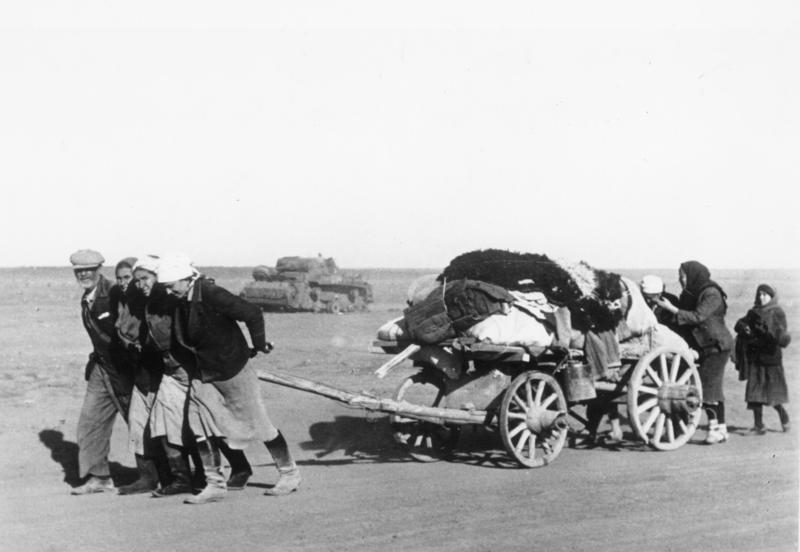
Russian refugees, near Stalingrad 1942 (Bundesarchiv, Bild 183-J19568 / Gehrmann, Friedrich / CC-BY-SA 3.0, CC BY-SA 3.0 DE)
Can you imagine walking from Warsaw to the Bosporus with two teenage daughters? Apart from the physical effort, consider the mental strain, the risks and dangers they had to confront. And the terrible thing is it is all happening again.
Well, this is the background inspiration to my ‘Victory in Exile’ story, where I have woven together tales told by my Dutch neighbour and the tragedy of innocent refugees trying to find a safe haven in a world at war. A challenge that may require someone to create a whole new persona.
To this, I have added my own experience of being a voluntary exile. I live in Spain permanently now, but I have lived in various different countries and I know what it is like not to speak the language, not to share commonly acknowledged values; what it is like to be gaped at because your appearance or style doesn’t fit with the locals. I’ve been here on and off over 30 years and even last Saturday somebody asked me where I was from. I bristled, but it was a friendly query – and a timely reminder of what being an involuntary exile must be like for those who can never go home.
————-
Connect with J G Harlond
Website: https://www.jgharlond.com
Twitter: @JaneGHarlond https://twitter.com/JaneGHarlond
Facebook author page: https://www.facebook.com/JGHarlondauthor
Penmore Press: www.penmorepress.com
————
Read Jane’s latest book:
Secret Meetings
So,” Bob said to Laurie, “all we have to do is rumble a double agent and find a cold-blooded assassin. Or nail one of three homely women for a domestic homicide. School-boy like you and an old codger like me, should be a piece of cake.”
Cornwall, Spring, 1944
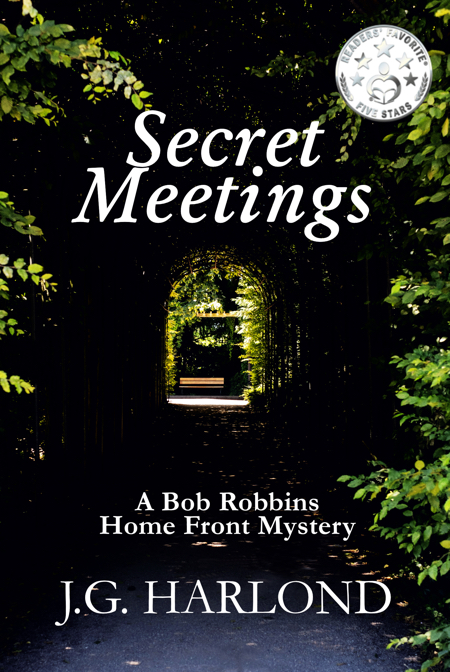 A lone traveller arrives at a harbour inn carrying a satchel of weapons, then appears in the grounds of River Lodge, a typical English country house in wartime.
A lone traveller arrives at a harbour inn carrying a satchel of weapons, then appears in the grounds of River Lodge, a typical English country house in wartime.
Except with a scandalous family history, the reluctant host’s wife and servants harbouring secrets and grievances, a glamourous trans-Atlantic socialite and an uninvited American professor in residence there is nothing normal about River Lodge.
Then Bob Robbins arrives impersonating Winston Churchill and there is a tragic accident. Or is it daylight murder? And who was the intended victim? Was it caused by the crank stalking Churchill, or is it a domestic homicide? Is it related to the upcoming Allied counter-invasion of France?
To solve the mystery, DS Robbins investigates the crime knowing his own life is in danger. Aided by the studious young PC Laurie Oliver, Bob must identify a murderer, expose a double agent, and ensure the secrecy of the upcoming Normandy Landings.
Buy this book here: https://www.bklnk.com/B0BVKVFHCF
Alison Morton is the author of Roma Nova thrillers – INCEPTIO, CARINA (novella), PERFIDITAS, SUCCESSIO, AURELIA, NEXUS (novella), INSURRECTIO and RETALIO, and ROMA NOVA EXTRA, a collection of short stories. Audiobooks are available for four of the series. Double Identity, a contemporary conspiracy, starts a new series of thrillers. JULIA PRIMA, Roma Nova story set in the late 4th century, starts the Foundation stories. The sequel, EXSILIUM, will be out in January 2024.
Find out more about Roma Nova, its origins, stories and heroines and taste world the latest contemporary thriller Double Identity… Download ‘Welcome to Alison Morton’s Thriller Worlds’, a FREE eBook, as a thank you gift when you sign up to Alison’s monthly email update. You’ll also be among the first to know about news and book progress before everybody else, and take part in giveaways.
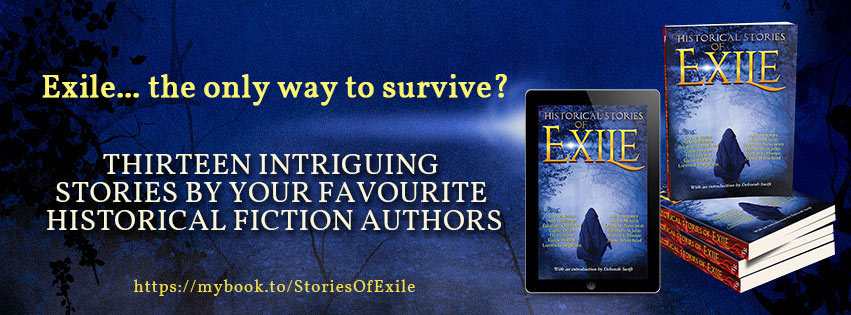
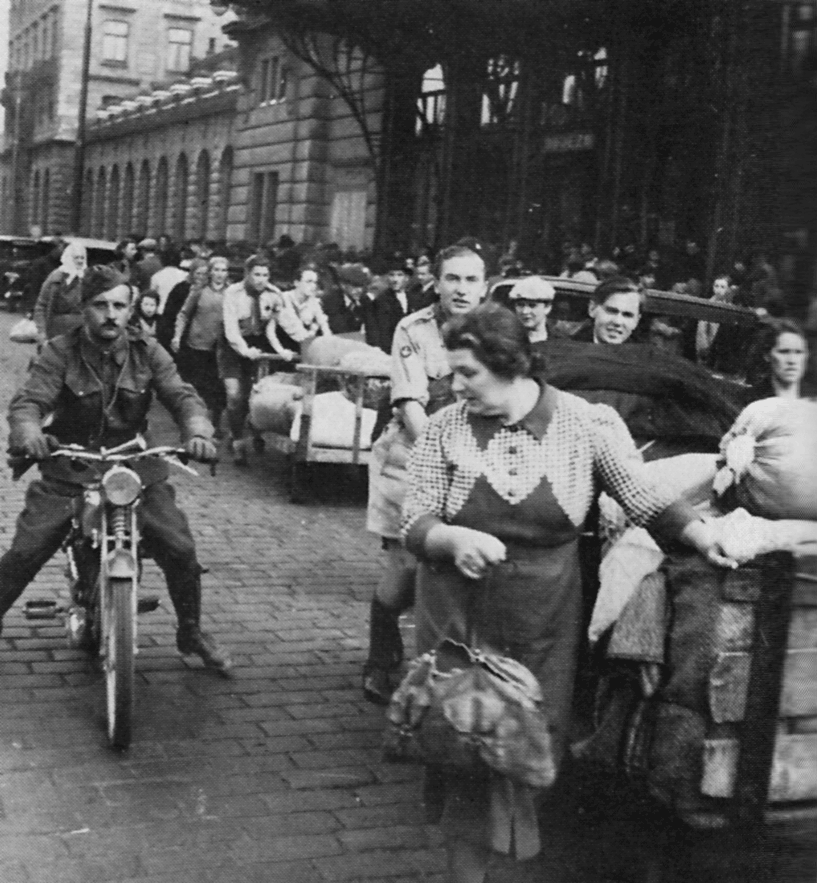













Thank you for hosting my post, Alison, so I can show the real history behind my short story.
An absolute pleasure. The background story is often as interesting as the short story itself.
As Helen comments, refugees are still very much with us and make a new life somewhere else is, as you know, not always easy.
Because of my arthritis I find it difficult to walk more than fifty yards… and I’m not sure I’d appreciate being pushed to Exmoor (I’m nearer Exmoor than Dartmoor) in the rain in wheelbarrow – the only ‘cart’ we have with wheels…
The sad horror is that thousands of people are, yet again, having to forcibly walk many, many miles into exile through no fault of their own. And at the moment there’s nothing we can do about it, except pray for them in our own way.
Exactly, Helen, history repeating itself, and not just in Europe.
Jane, this post is fascinating background to your superb story, and made all the more poignant by your personal connections to people who endured WWII in Europe and the U.K.
Wonderful background to your story, Jane.
What an interesting but poignant read.
A lovely post Jane, with such touching details about the hardships endured by so many people. And you wove the details into your story so well; it’s a great read 🙂